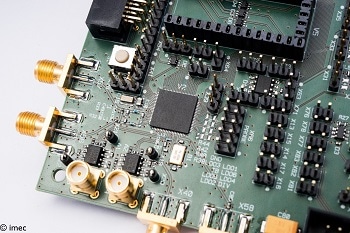New Low-Power Radio Chip for Long-Range Connectivity in sensor networks and Future Cellular IoT Applications

The world-leading nanoelectronics research centers imec and Holst Centre (set up by imec and TNO), presented a low-power wide-area (LPWA) multi-standard radio chip today at imec’s annual technology forum in Brussels (ITF Brussels 2016). The new radio chip is a best-in-class product, which can operate with a lower level of power consumption than any other radio chip technology released to date for long range connectivity in sensor networks. The sub-GHz radio chip’s technology can serve a multitude of protocols including IEEE 802.15.4g/k, W-MBUS, KNX-RF, as well as the popular LoRa and SIGFOX networks, and future cellular IoT for applications such as smart metering, smart home, smart city and critical infrastructure monitoring.
The radio chip operates in industrial, scientific, medical (ISM) and short-range devices (SRD) bands, covering a frequency range from 780MHz to 930MHz. The robust, low-power design combines a large link budget, with state-of-the-art interference rejection and lowest bill of materials by minimizing external components as compared to of-the-shelf available chips. The radio is implemented as a complete System-on-Chip (SoC) including the RF front end, power management, an ARM processor,160kBytes of SRAM and peripherals like SPI, I2C and UART. It features a targeted sensitivity of -120dBm at 0.1% BER (1kbps) and ultra-low power consumption of 8mW (Rx) and 113mW (Tx) for 13.5dBm output power. The receiver supports a wide gain range to handle input signals from -120dBm to -15dBm, corresponding to a large dynamic range of 105dB. The PA features automatic ramp-up and ramp-down for ARIB spectral mask compliancy. Furthermore, the output power is controllable from <-40dBm up to 15dBm.
With the foreseen release of the NB-IoT protocol in June 2016 by the 3GPP, it is clear that protocols such as NB-IoT, SigFox and LoRA are here to stay for the coming years. Our novel sub-GHz radio chip can serve multiple of these protocols and is an ideal solution for long-range wireless connectivity for IoT applications.
Kathleen Philips, Program Director Perceptive Systems at imec/Holst Centre.
Imec’s Industrial Affiliation program on the Intuitive Internet-of-Things (IoT) focuses on developing the building blocks for the future. The program explores an intuitive IoT, with sensor systems that can detect and assist with the needs and wants of people in an unobtrusive way, and can take into account their varied perspectives and surrounding environment. Along with low-power radio chips, imec also develops ultra-small, low-cost, intelligent, and ultra–low power sensors and heterogeneous sensor networks. Interested companies are invited to partner with imec on its varied research initiatives. Companies can also connect with imec to request access to imec’s technological advances to further develop their projects through licensing programs with imec.